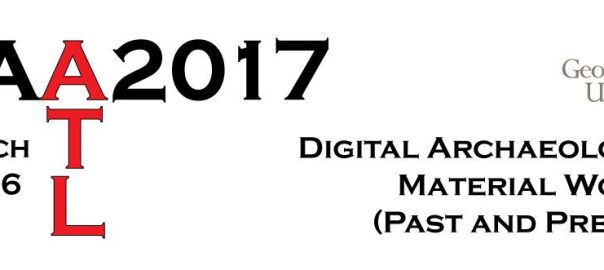Mechanics, Mods and Mashups session for CAA2017 in Atlanta Georgia 14-16 March 2017 has been accepted!! More soon.



Mechanics, Mods and Mashups session for CAA2017 in Atlanta Georgia 14-16 March 2017 has been accepted!! More soon.

My proposal to the 2017 Computer Applications and Quantitive Methods in Archaeology (CAA) international conference, March 14th and 16th, 2017 at Georgia State University, Atlanta, GA, USA) has been accepted.The below will be updated when I speak to the co-organisers but we are thinking of a morning presentation and (possible) game pitch, and an aftertoon work on key ideas..
CAA2017 Atlanta: Other Session
Mechanics, Mods and Mashups: Games of the Past for the Future Designed by Archaeologists
Organizers: Erik Champion, Michael Nitsche, Natalie Underberg-Goode
Are you a fan of Assassin’s Creed but upset over how it could have made history exciting without having to employ and manipulate central historical characters? Love Lara Croft: Tomb Raider if only the tomb-raiding (stealing) mechanics could be replaced by something more meaningful? Wish that the Total War Series allowed you to employ agent modeling to test competing archaeological theories of migration, colonization and invasion or just to improve its historical accuracy? Dream you could use the language, graphic vision and immersion of Far Cry Primal in the classroom to explain (through engaging interaction) the Mesolithic rather than primarily use it as a backstage to fight semi- believable creatures? Then this workshop is for you. Correction. This workshop is BY you.
Archaeologists and people of a historical persuasion:
The audience will:
Give the writers feedback ideas and nominate the best presentation in terms of fun and engagement, imaginative ideas, and archaeological relevance (in promoting archaeology, teaching archaeology or extending archaeological scholarship).
Potential tools:
Gameplay cards, game prototyping tools, scenes or videos from a 3D editor or game editor (Unity, Unreal, Blender), board games as prototypes, playing cards, physical artifacts that are role-played by the presenter, illustrations, slideshows, game editors (like the SIMS: https://www.thesims.com/en_GB) used to make films (Machinima), roleplaying videos, flowcharts, interactive fiction (like https://twinery.org/). We will provide a fuller list of tools and examples to potential attendees before the workshop.
Equipment:
PC with sound and display, some floor space to move around in for physical re-enactments. Tables or some form of desk to provide written or graphical feedback.
Length:
Participants: 26 maximum (ideally) where 6 present. We require half an hour a presenter so three hours for 6 presenters, 6 hours a whole day if we want to go to 12 presenters.
Ideally the non-presenting audience is not too large, preferably up to 20.
Outcome:
We will approach a creative publisher (Liquid Books, University of Michigan Press or other) to provide an online or printable output of the demonstrations and the audience feedback.
We would also like to invite presenters – if they can make it – to a workshop at DIGRA2017 Melbourne Australia to test out their demonstrations and play-throughs to game academics.
References
Champion, E. (2012) Game Mods: Design, Theory and Criticism. Entertainment Technology Centre Press.
I have only ever reviewed for CAA but the papers I have reviewed have been consistently better than for other heritage conferences and I respect the work of the people behind CAA. I highly recommend the organisation.
I love the CAA and I thoroughly enjoy being able to give something back to this community by being CAA secretary. If you think this is a great community and are keen to be involved, consider applying for one of the open positions!
Computer Applications and Quantitative Methods in Archaeology (CAA) invites CAA members to apply for one of four open committee posts: outreach officer, treasurer, publication officer, bursary and student/low income officer. The current treasurer and publication officer will stand down at CAA2016 in Oslo, the outreach and the bursary and student/low income officers are two new posts. Candidates must be CAA members and applications by all CAA members will be considered. CAA encourages in particular applications from female or non-European CAA members. The tasks associated with these posts are given below. Candidates must express an interest in the posts before 29 February 2016 by sending a motivational statement…
View original post 936 more words